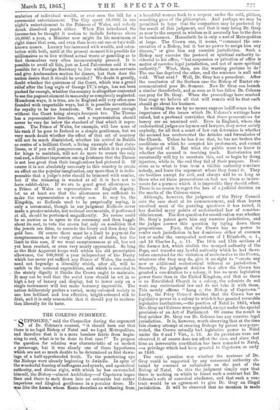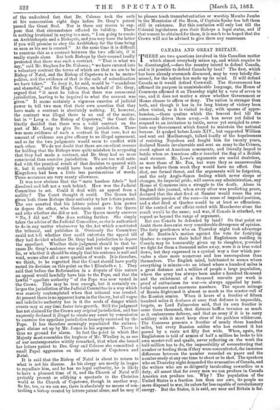THE COLENSO JUDGMENT.
" SUPPOSING," said the Chancellor during the argument of Dr. Colenso's counsel, "it should turn out that there is no legal Bishop of Natal and no legal Metropolitan, and therefore that it is a mere baseless fabric from begin- ning to end, what is to be done in that case ?" To propose the question for solution was characteristic of so modest a personage, but it was clearly one of those hypotheses which are not so much doubts to be determined as first dawn- ince3 of a half-apprehended truth. To the penetrating eye the Bishops were already beginning to dwindle. In spite of the wonderful fencing of suffragans and synods, and apostolical authority, and divine right, with which he has surrounded himself, the Bishop—almost Archbishop—of Capetown began then and there to melt down into an estimable but rather imperious and illogical gentleman in a peculiar dress. He
as like the Lamia whom Keats describes as withering from a beautiful woman back to a serpent under the cold, pitiless searching gaze of the philosopher. And perhaps we may be permitted to hope that the comparison may be perfected by the result of this judgment, and that it may bring Dr. Gray as near to the serpent in wisdom as it assuredly has to the dove in harmlessness. Henceforth he is only a sort of Metropolitan at large. The Crown can, it seems, "command the con- secration of a Bishop, but it has no power to assign him any diocese," or give him any coercive jurisdiction. Such a Bishop may exercise the pastoral or spiritual authority in- cidental to his office, "but suspension or privation of office is matter of coercive legal jurisdiction, and not of mere spiritual
authority." What, then, are the warring prelates to do ? The one has deprived the other, and the sentence is null and void. What next ? Well, Dr. Gray has a precedent. After. the conclusion of the Gorham case the Bishop of Exeter ex- communicated poor Dr. Sumner. Now Dr. Gray can launch a similar thunderbolt, and as soon as it has fallen Dr. Colenso can pray for Dr. Gray. When the proceedings have reached that stage we believe all that will remain will be that each should go about his business.
In writing thus we by no means express indifference to the importance of the issues which Dr. Colenso's writings have raised, but a profound conviction that these prosecutions for heresy are an unmixed evil. Even in England, where the ecclesiastical judges are laymen and lawyers, they never satisfy anybody, for all that a court of law can determine is whether the accused has controverted the Articles and formularies of the Church. Unless he has done that, he has not broken the conditions on which he accepted his preferment, and cannot be deprived of it. But what the public want to know is
whether the accused is teaching truth. Ecclesiastics not unnaturally will try to ascertain this, and so begin by doing, injustice, while in the end they fail of their purpose. Deci- sions as to what is true from a fallible authority convince nobody, and leave the argument where they found it. They are bootless except for evil, and always will be so long as those who set these prosecutions on foot use them as instru- ments for a purpose which it is impossible they should effect. There is no reason to regret the loss of a judicial decision on the merits of the Colenso cause.
Although, however, the judgment of the Privy Council cuts the case short at its commencement, and thus leaves unsolved most of the puzzling questions it has raised, it has decided many points of ecclesiastical law of consider- able interest. The first question for consideration was whether Dr. Gray's patent gave him any coercive jurisdiction, and the judges answer this question by laying down three•
propositions. First, that the Crown has no power to confer such jurisdiction in her dominions either at common law or under the unrepealed sections of 1 Elizabeth, (3. 1., and 16 Charles I., c. 11. The 16th and 17th sections of the former Act, which abolish the usurped authority of the Pope, and transfer any lawful authority which he had there- tofore exercised for the visitation of ecclesiastics to the Crown, whatever else they may do, give it no right to "create any new or additional ecclesiastical tribunal or jurisdiction." Secondly, the judgment decides that after the Crown has granted a constitution to a colony, it has no more legislative power there than in the United Kingdom, and that as there is no Established Church in a colony, the colonists do not want any ecclesiastical law and do not take it with them. This merely affirms " Long v. the Bishop of Capetown." Lastly, the Privy Council decides that the Crown has no legislative power in a colony to which it has granted revocable legislative institutions,—the position of Natal in 1853, when Drs. Gray and Colenso were appointed, except under the special provisions of an Act of Parliament. Of course the result is that neither Dr. Gray nor Dr. Coleuso has any coercive legal jurisdiction. It is, however, worth observing that at the time this clumsy attempt at creating Bishops by patent was perpe- trated, the Crown actually had legislative power in Natal under the 6 and 7 Viet., c. 13. As its, provisions were not observed it of course does not affect the case, and since that time an irrevocable constitution has been conceded to Natal, —a privilege which had been grouted to Capetown as early as 1850.
The next question was whether the sentence of Dr. Gray could be supported by any consensual authority ob- tained by contract or submission on the part of the- Bishop of Natal. On this the judgment simply says that there is nothing on which to found such a contract but Dr. Colenso's oath of canonical obedience, and that such a con- tract would be an agreement to give Dr. Gray an illegal jurisdiction. It will be observed that no mention is made of the undoubted fact that Dr. Cotense took the oath at his consecration eight days before Dr. Gray's patent passed the Great Seal. Nor is there any reason to sup- pose that that circumstance affected its validity. There is nothing irrational in saying to a man, "I am going to create an Archbishopric and a Bishopric, and you may have the latter if you will promise to obey the Archbishop for the time being as soon as his see is created." It the same time it is difficult to construe this as a contract between the two officials, if it really stands alone. But both Bishops by their counsel loudly protested that there was such a contract. "That is what we say," said Mr. Stephen for Dr. Colenso ; "we have entered into a voluntary contract the terms of which are that we are to be Bishop of Natal, and the Bishop of Capetown is to be metro- politan, and the evidence of that is the oath of subordination we have taken." To deny it, he said, would be "scandalous and shameful," and Sir Hugh Cairns, on behalf of Dr. Gray, argued that "it must be taken that there was consensual jurisdiction, leaving to be inquired to what the consent was given." It seems certainly a vigorous exercise of judicial power to tell two men that their own assertion that they have made a contract is absolutely nothing. If, however, the contract was illegal there is an end of the matter, but in " Long v. the Bishop of Capetown," the Court dis- tinctly decided that there was a valid contract on the part of Mr. Long to give Dr. Gray jurisdiction. There was more evidence of such a contract in that case, but no amount of evidence can give efficacy to an illegal agreement, and so far the two judgments would seem to conflict with each other. We do not doubt that there are excellent reasons for holding that the Bishops were quite mistaken in supposing that they had made a contract, and Dr. Gray had no more consensual than coercive jurisdiction. We are too well satis- fied with the practical result of that decision to quarrel with it, but it certainly would have been satisfactory if Lord Kingsdown had been a little less parsimonious of words. Three sentences are very scanty allowance.
It was now obvious that the "mere baseless fabric" had dissolved and left not a rack behind. How was the Judicial Committee to act. Could it deal with an appeal from a nullity ? The Court thought it could. The Queen had given both these Bishops their authority by her letters patent. The one asserted that his letters patent gave him power to depose the other, who thereupon comes to the Queen and asks whether she did or not. The Queen merely answers "No, I did not." She does nothing further. She simply takes the advice of the Judicial Committee, as she is authorized to do in any matter whatsoever by the Act which constituted the tribunal, and publishes it. Obviously the Committee could not tell whether they could entertain the appeal till they had decided whether Dr. Gray had jurisdiction to depose the appellant. Whether their judgment should be that be- cause Dr. Gray's sentence was null and void no appeal would lie, or whether it should be simply that his sentence is null and void, seems after all a mere question of words. It is therefore, we think, to be regretted that the Court should have partly rested its decision on this point on the 1 Elizabeth c. 1. They said that before the Reformation in a dispute of this nature an appeal would lawfully have lain to the Pope, and that the lawful "appellate authority" of the Pope was now vested in the Crown. This may be true enough, but it certainly en- larges the jurisdiction of the Judicial Committee in a way which was scarcely contemplated when that tribunal was created. It present there is no apparent harm in the theory, but all vague and indefinite authority has in it the seeds of danger which -events may at any time foster into growth. Still the judgment has not claimed for the Crown any original jurisdiction, and has expressly declared it illegal to create any court by commission to exercise the appellate jurisdiction formerly exercised by the Pope. It has therefore seemingly repudiated the extrava- gant claims set up by Mr. James in his argument. There is thus no ground for alarm. In fact the point in which Her Majesty most resembles the bugbear of Mr. Whalley is, as one of our contemporaries wittily remarked, that when she issued her letters patent to Drs. Gray and Colenso she committed a small Papal aggression on the colonies of Capetown and Natal.
It is said that the Bishop of Natal is about to return to what is not his diocese. As his clergy are mostly in league to repudiate him, and he has no legal authority, he is likely to have a pleasant time of it, and the Church of Natal will probably present as edifying a spectacle to the Christian world as the Church of Capetown, though in another way. floe far, too, as we can see, there is absolutely no means of con- trolling a bishop created by letters patent alone, and he may if he pleases teach transubstantiation or worship Mumbo Jumbo in the Mountains of the Moon, if Captain Speke has left them still in existence. But this confusion will only last till the Colonial legislatures give their Bishops a legal status, and if that cannot be obtained for them, it is much to be hoped that the Crown will not be advised to give them any successors.































 Previous page
Previous page